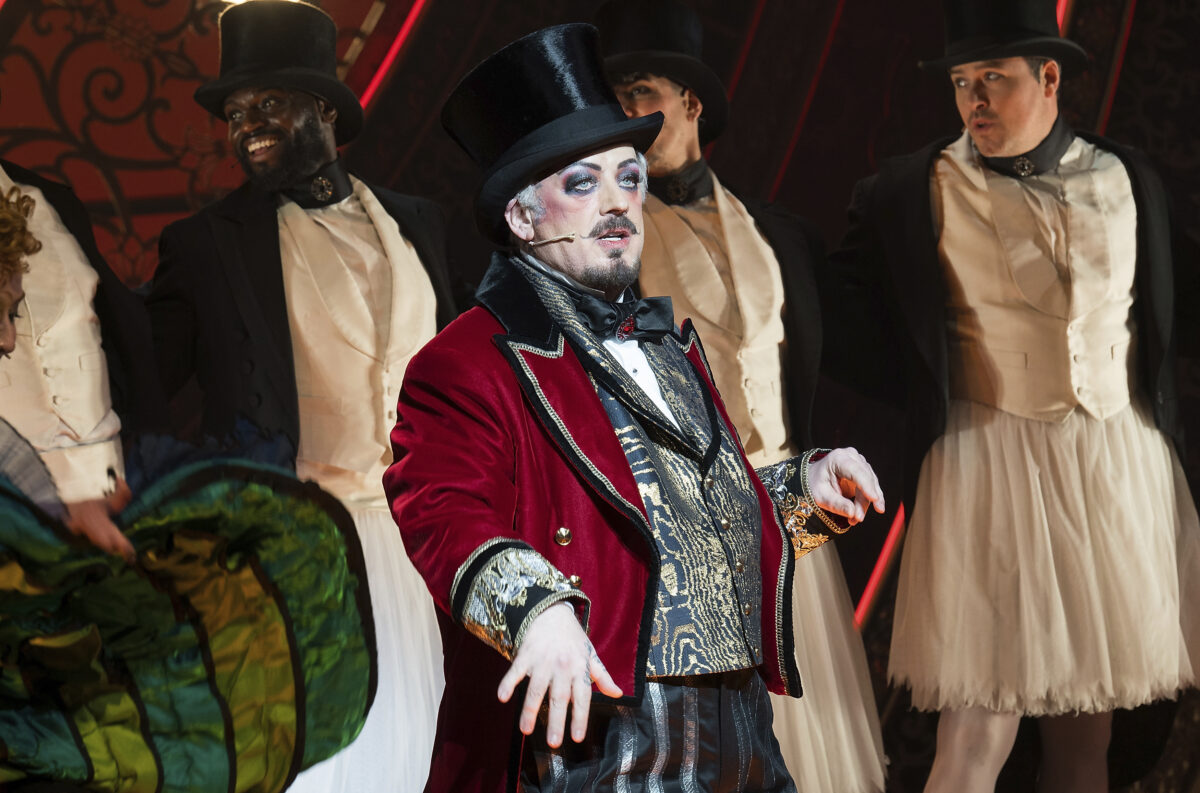
Boy George, center, is pictured on stage during the curtain call for his debut performance in “Moulin Rouge! The Musical” at the Al Hirschfeld Theatre on Tuesday, Feb. 6, 2024, in New York. (Photo by Evan Agostini/Invision/AP)
NEW YORK—Rock stars famously don’t get up before noon, and rock stars in big Broadway shows each night surely stagger awake late in the afternoons. Not Boy George.
“I’m not really rock ‘n’ roll,” he says, laughing. “I’m more frock ‘n’ roll.”
The singer-songwriter and beating heart of the iconic band Culture Club is these days playing the role of the impresario in the Tony Award-winning “Moulin Rouge” until May 12.
The jukebox musical is a stage adaptation of director Baz Luhrmann’s iconic 2001 film of the same name starring Nicole Kidman and Ewan McGregor. It’s packed with pop tunes by Katy Perry, the Rolling Stones and Elton John.
“One of the great things about ‘Moulin Rouge,’ which proves my point, is that pop music works in a theatrical space and theatrical music works in a pop space,” Boy George says.
Boy George, previously on Broadway in 2004 with “Taboo,” is a trailblazer in fashion and music, with a string of hits including “Karma Chameleon,” “Do You Really Want to Hurt Me” and “Time (Clock of the Heart).”
In a recent conversation, he spoke to The Associated Press about returning to the Great White Way, his musical inspirations and how he’s mellowed.
AP: Welcome back to Broadway. How does this feel in comparison to “Taboo”?
BOY GEORGE: It’s very different to my last experience, because, obviously, breaking a show on Broadway is a different story altogether. It is an entirely different experience stepping into this big, boisterous, colorful show.
AP: Is singing live with a band much different from being part of a stage show?
BOY GEORGE: It’s very different because you’re the boss. You get to decide what happens. If you want things to stop or change or take a different direction, you can do it. You are in charge. And in this type of environment, you’re part of a very well-oiled kind of theatrical machine.
AP: You get to sing a few Culture Club songs at the end of each show, “Do You Really Want to Hurt Me” and “Karma Chameleon.” Is that fun?
BOY GEORGE: If you want an honest answer, I would have chosen 100 other songs other than those two, because I don’t necessarily think that they’re necessarily the most important things I’ve ever done.
AP: Is it fun playing an over-the-top nightclub owner?
BOY GEORGE: One of the great things about “Moulin Rouge” is it’s such a slap of joy. It doesn’t need me, so I just add something. Do you understand? It works without me. But if you can bring something else to it, that’s super exciting.
AP: The show has old and new songs. Do you find many fans out there going back to find the roots of today’s music?
BOY GEORGE: There are lots of kids who dig a bit deeper in the same way that I did. When I was a kid, I could have just hung on to what was on the radio, but I went through my parents record collection. I went into junk stores and I found albums like, “Oh, this looks interesting. Who’s this?” I had that kind of pioneering spirit to find things. Even now, I get excited about finding a singer I didn’t know about.
AP: You’ve got tattoos of musicians like Marc Bolan of T. Rex and David Bowie. Are both of them in your music as well?
BOY GEORGE: I think all the best music is a mixture of everything you love. You know, people say to me all the time, “Oh, that sounds like Bowie.” And I’m like, “Not by accident!”
AP: What is making new music like for you?
BOY GEORGE: You’re always dipping into this pantry of ideas. There’s this huge sort of creative pantry that you go in and depending on your mood, you might pick out a bit of Nina Simone. You might find some Drake and think, “Oh, that’s interesting. What would Bowie do with Drake?” That’s how I think: What would Bowie do with a disco track?
AP: You’re seemingly always putting out new music—on Instagram, or with the band We Are Brando, or on the “Argylle” soundtrack.
BOY GEORGE: I probably am the most prolific songwriter I know. I just write every day. I’m not saying every single one of them is a gem, but I think when you keep doing stuff, you just get better at it, you know? When people talk about writer’s block, what does that even mean? Because every word that you could possibly use already exists. Where’s the block?
AP: Which comes first for you — melody or words?
BOY GEORGE: I tend to hear a melody and then think of a really interesting lyric. I always think if you find what you want to say, you will find a way to say it.
AP: In your latest memoir, “Karma,” you write that you’ve grown kinder to yourself and others. That’s nice, right?
BOY GEORGE: If you told me 10 years ago, 20 years ago, that I could actually change the way I think about things, I would have laughed at you. I would of gone, “Yeah, no, I’m definitely stubborn and opinionated.” And, you know, it’s quite nice to discover you’re wrong.

